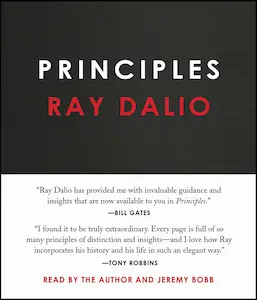Principles - Summary
Ray Dalio

Introduction
In his book “Principles,” Ray Dalio, a highly successful investor and founder of Bridgewater Associates, shares his unique insights and principles for achieving success in life and business. Dalio’s book serves as a guide to help individuals navigate through challenges and make better decisions by adopting a systematic approach. This book summary will provide an overview of the key concepts discussed in “Principles,” highlighting examples and anecdotes from the book to illustrate Dalio’s principles in action.
Understanding Principles
Dalio begins by emphasizing the importance of understanding and applying principles in our lives. He defines principles as fundamental truths that can guide our actions and decisions. According to Dalio, principles help us understand how the world works and enable us to make better choices. He encourages readers to develop their own set of principles based on their experiences and observations.
The Power of Radical Truth and Transparency
One of the core principles Dalio advocates for is radical truth and transparency. He believes that creating an environment where people can openly express their thoughts and opinions leads to better decision-making and fosters innovation. Dalio shares an anecdote from his own company, Bridgewater Associates, where radical transparency is a fundamental part of their culture. Employees are encouraged to challenge ideas and provide honest feedback, leading to continuous improvement and learning.
Embracing Failure as a Learning Opportunity
Dalio emphasizes the importance of embracing failure as a valuable learning opportunity. He shares personal anecdotes of his own failures and how they have shaped his success. Dalio believes that failure is an inevitable part of life and that learning from it is crucial for personal growth. By embracing failure and analyzing the root causes, individuals can make better decisions and avoid repeating the same mistakes.
The Art of Thoughtful Disagreement
Dalio highlights the significance of thoughtful disagreement in decision-making processes. He encourages individuals to seek out diverse perspectives and engage in thoughtful debates to arrive at the best possible solutions. Dalio shares an example from his own company, where he encourages employees to challenge each other’s ideas and engage in intellectual battles to refine their thinking. By embracing thoughtful disagreement, individuals can overcome biases and make more informed decisions.
Building a Culture of Radical Open-Mindedness
Another key principle discussed in the book is the importance of radical open-mindedness. Dalio argues that being open-minded and receptive to new ideas is crucial for personal and professional growth. He shares examples of how closed-mindedness can hinder progress and limit opportunities. Dalio encourages readers to actively seek out different perspectives, challenge their own beliefs, and be open to changing their minds based on new information.
The Importance of Systemizing Decision-Making
Dalio emphasizes the need for systematic decision-making processes to avoid biases and improve outcomes. He suggests creating algorithms or decision-making frameworks that can be applied consistently to various situations. Dalio shares his own decision-making process, which involves gathering data, seeking diverse opinions, and weighing the pros and cons before making a final decision. By systemizing decision-making, individuals can reduce the impact of emotions and make more rational choices.
Principles for Successful Relationships
Dalio extends his principles beyond business and investment to relationships. He discusses the importance of understanding people’s individual principles and aligning them with our own to build successful relationships. Dalio shares anecdotes from his personal life, highlighting the significance of open communication, empathy, and mutual respect in fostering healthy relationships.
Applying Principles to Achieve Success
In the later part of the book, Dalio provides practical advice on applying principles to achieve success. He emphasizes the importance of setting clear goals, identifying obstacles, and developing strategies to overcome them. Dalio encourages readers to constantly iterate and refine their approach based on feedback and results. He shares examples of successful individuals who have applied his principles to achieve remarkable outcomes.
The Evolution of Principles
Dalio acknowledges that principles are not fixed and should evolve over time. He encourages readers to continuously learn, adapt, and refine their principles based on new experiences and observations. Dalio shares his own journey of developing and refining his principles throughout his career, highlighting the importance of continuous improvement.
Conclusion
In “Principles,” Ray Dalio provides readers with a comprehensive guide to achieving success in life and business. By embracing radical truth and transparency, learning from failure, engaging in thoughtful disagreement, and fostering open-mindedness, individuals can make better decisions and achieve their goals. Dalio’s book is filled with examples and anecdotes that illustrate the power of principles in action. By applying the principles discussed in this book, readers can navigate challenges, overcome obstacles, and ultimately lead more fulfilling and successful lives.